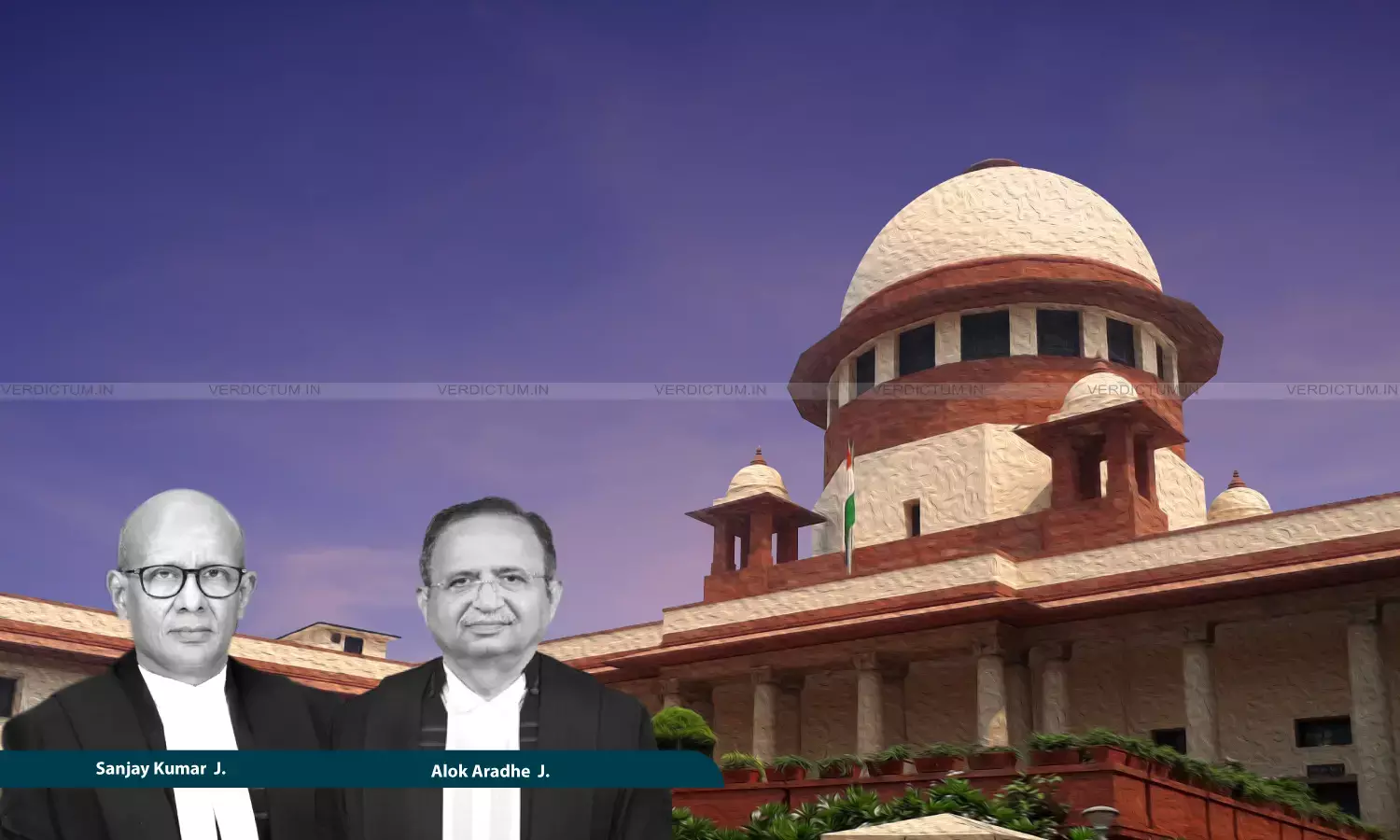Intellectual Property Disputes Not Confined To Private Realm; Counterfeit Innovation Deceives Consumers, Taints Marketplace: Supreme Court
The Apex Court observed that disputes involving intellectual property extend beyond private commercial interests, as imitation that poses as innovation deceives consumers, distorts market integrity, and erodes public confidence in trade fairness.

Justice Sanjay Kumar, Justice Alok Aradhe, Supreme Court
The Supreme Court has held that intellectual property disputes are not limited to private commercial conflicts but carry a significant element of public interest, given their direct impact on consumer trust and market integrity.
The Apex Court was hearing an appeal filed by a Denmark-based engineering firm against the Himachal Pradesh High Court’s decision rejecting its commercial suit on the ground of non-compliance with Section 12A of the Commercial Courts Act, 2015.
A Division Bench comprising Justice Sanjay Kumar and Justice Alok Aradhe, while making these observations, remarked that “the court cannot be unmindful of the fact that intellectual property disputes are not confined to the private realm,” emphasising that “when imitation masquerades as innovation, it sows confusion among consumers, taints the marketplace and diminishes faith in the sanctity of the trade.”
Senior Advocate Gaurav Pachnanda appeared on behalf of the appellant, while Senior Advocate Shadan Farasat the respondents.
Background
The appellant, a global manufacturer of industrial fans under the brand, had entered into a dealership agreement with an Indian distributor for marketing its products. Following termination of that arrangement, the appellant discovered that identical fans were being produced and sold under a deceptively similar brand through another company linked to the former distributor.
Claiming violation of its patents and design rights, the appellant instituted a commercial suit before the Himachal Pradesh High Court seeking an injunction and damages. Alongside, it applied for exemption from pre-institution mediation under Section 12A of the Commercial Courts Act, citing continuing infringement and immediate harm to its proprietary rights.
The Single Judge dismissed the suit for non-compliance with Section 12A, finding that the six-month delay between discovery of infringement and filing of the suit defeated the claim of urgency. The Division Bench affirmed the order, holding that continuous infringement could not override statutory mediation requirements.
Aggrieved by these concurrent findings, the appellant approached the Supreme Court.
Court’s Observation
The Supreme Court, while examining the purpose of Section 12A and the scope of “urgent interim relief,” held that intellectual property infringement, being a “continuing wrong”, creates recurring causes of action. The Court noted that every day of imitation inflicts renewed harm upon the proprietor’s goodwill and upon the marketplace itself.
While underlining the relevance and urgency surrounding matters of Intellectual Property Rights, the Bench stated that “the public interest element, need to prevent confusion in the market and to protect consumers from deception further imparts a colour of immediacy to the reliefs sought.”
Citing its earlier decision in Midas Hygiene Industries Pvt. Ltd. v. Sudhir Bhatia (2004), the Bench reiterated that delays in filing applications do not legalise infringement and that courts must prevent ongoing deception rather than allow procedural formality to protect infringers.
Furthermore, highlighting the judicial responsibility in ensuring faith in market discipline and the authenticity of products, the Bench stressed that “the appellant’s prayer for injunction cannot be characterised as mere camouflage to evade mediation, it is a real grievance founded on the continuing nature of infringement and irreparable prejudice likely to be caused by the delay.”
“The court must look beyond time lag and evaluate the substance of the plea for interim protection”, the Apex Court concluded.
Conclusion
Holding that IP infringement involves issues of both private right and public welfare, the Supreme Court clarified that courts must view such cases through a lens of public interest and act to prevent confusion and deception in trade.
Accordingly, the Court set aside the High Court’s orders rejecting the plaint for non-compliance with Section 12A and restored the commercial suit for adjudication on merits.
Cause Title: Novenco Building And Industry v. Xero Energy Engineering Solution Private Limited & Anr (Neutral Citation: 2025 INSC 1256)
Appearances
Petitioner: Senior Advocate Gaurav Pachnanda, with Advocates Pankaj Soni, Vineet Rohilla, Shradha Karol, Rohit Rangi, Debashish Banerjee, and others.
Respondents: Senior Advocate Shadan Farasat, with Advocates Abhishek Babbar, Harshit Anand, Yash S. Vijay, AOR, and Shikhar Aggarwal.


